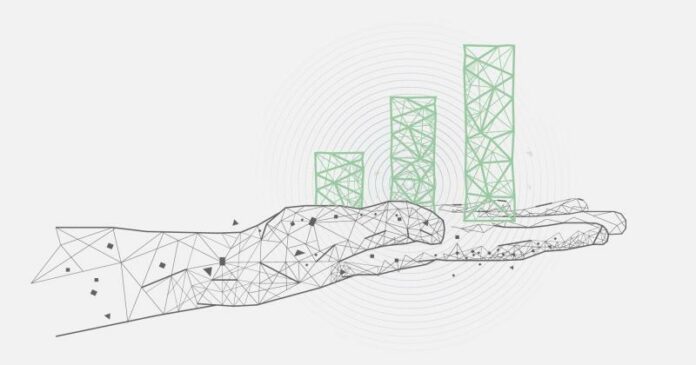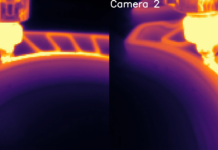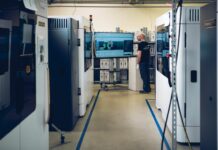Who recently purchased what? Who expands its production capacities? And who will distribute what? This edition of “news roundup” covers multiple purchases and 3D printing partnerships across the world.
Lithoz announces two installations of ceramic 3D printers in the UK & in South Africa
In a certain way, 3D printer manufacturer Lithoz continues to achieve milestone in its journey. The Austrian OEM has recently installed a ceramic 3D printer at Cut Institute in Bloemfontein, South Africa and for the first time, a Cerafab Multi 2M30 in the UK.
Funded by the South African Ministry of Higher Education, Science and Innovation, and installed inside the ISO13485 accredited Centre for Rapid Prototyping and Manufacture, the new 3D printer aims to democratize healthcare possibilities and treatment for the entire population.
CUT is acknowledged for its research and innovation in additive manufacturing for medical implants. With the newly installed ceramic 3D printing machine, the research institute ambitions to advance research on customized medical device manufacturing via 3D printing.
In another country, – the UK this time -, and with a different machine – CeraFab Multi 2M30 -, Lithoz makes another team of scientists happy. Compound Semiconductor Applications (CSA) Catapult, has received the CeraFab Multi 2M30. It’s also the first time that the machine is installed in the UK.
CSA Catapult is an organization that aims to bridge the gap between companies developing novel semiconductor materials, topologies and devices, and those developing systems for end-user applications. With the new multi-material 3D printer onboard, the organization will “develop novel 3D-printed multi-material parts for high-power and high-frequency microelectronics packages.” According to Dr. Jayakrishnan Chandrappan, Head of Packaging at CSA Catapult, the multi-material printing facilities will drive energy-efficient, compact and affordable packaging.’
From a technological standpoint, let’s remind that the CeraFab Multi 2M30 is an LCM-based printer with two separate vats. Known for its ability to produce the strongest 3D-printed alumina, it can combine multiple materials within one single layer and can vary the material composition layer-by-layer.
Such material compositions allow for a mixture of differing properties in one single layer and component – thus paving the way to a completely new dimension of application possibilities and enabling a variety of design concepts unimaginable until now, Lithoz said in a press release.
Anisoprint debuts in North American Market through partnerships with Top 3D Group
The North America will be the next region to assess the capabilities of Anisoprint’s technology. Through a partnership with Top 3D Group, a supplier of 3D printers and 3D scanners, as well as CNC machines, robotic and end-to-end enterprise solutions, Anisoprint’s Continuous fiber 3D printing solutions will now be easily made available to the North American manufacturing industry.
The move was facilitated by an agreement with an experienced and goal-oriented partner; it has been a while since the search was started and now Anisoprint expects to grow the global network substantially, Anisoprint said in a press release.
The company plans to introduce to the market both desktop and industrial anisoprinting solutions: Composer and PROM IS 500 respectively and first professionals who will see these solutions in live will be guests at the upcoming RAPID + TCT 2022.
In the same move, Tech-Labs will distribute Freemelt’s metal AM solution in the US
Swedish Freemelt has signed an agreement with one of the major resellers within education, Technical Laboratory Systems Inc, Tech-Labs, which is active in eight states in central United States.
The announcement is a step forward for Freemelt’s research system, Freemelt ONE. As a reminder, Freemelt develops an open-source 3D printing platform based on Electron Beam Powder Bed Fusion (E-PBF). This solution delivers key benefits in terms of technology and materials. It can for instance process tungsten, titanium, and copper which are highly interesting materials in the scientific community in both aerospace and defense industries as well as in medical technology.
Tech-Labs on the other hand, has been leading the industry needs for technical and vocational training in Texas and Oklahoma for over forty years and have developed into a full-service education equipment and instructional software provider and expanded into Utah, Colorado, New Mexico, Wyoming, Idaho, and Montana.
Solukon is on a roadshow in the US
This one is neither a partnership, nor a distribution but rather the excitement of the Solukon team to be showcasing at two upcoming industry events in the USA: Rapid + TCT in Detroit, Michigan and Space Tech Expo in Long Beach, California.
At Rapid +TCT, booth 2137, the experts in depowdering will showcase the SFM-AT1000-S for parts with a max. height of 1,000 mm as well as the SFM-AT350, their solution for medium-sized parts. In a joint presentation with Morf3D, the team will also provide further insights into depowdering for space applications.
Morf3D and Solukon have jointly investigated how automated depowdering pushes the boundaries of 3D printable metal parts, paving the way to a real freedom in part design. Only if even the finest channels of a rocket engine or combustion chamber are free of powder (which is achieved through automated depowdering in the first place), components are ready for serial production and the New Space Race is on. In the presentation Michael and Franck will propose a generic use case that includes challenging features like gyroid structures, thin walls and intricate internal channels, the company says in a press release.
The roadshow will continue at booth 1017 of Space Tech Expo where space enthusiasts will learn more about depowdering in space AM applications.
OECHSLER ramps up production capacity in Germany and brings powder-based printing processes into series production
OECHSLER AG has just increased its capacities for series production using powder-based 3D printing process. The polymer technology company has signed a 7 figure contract with AMT and HP to develop and integrate a fully automated end-to-end post processing cell to bring powered-based printing processes into series production in Germany.
The Franconian technology company is bundling its additive manufacturing capacities at the site in Ansbach Brodswinden, including production, research and development.
With an additional 800 square meters, the technology company will host several industrial HP 3D printers at once. Furthermore, state-of-the-art quality assurance and an air-conditioned measuring rooms were each created on additional 150 square meters each.
To achieve this ambitious goal, OECHSLER is well aware that it could not do so without its multi-stage post-processing for industrialized production. The partnership with Additive Manufacturing Technologies (“AMT”) is crucial here as it will enable to develop and integrate a fully automated end to end post-processing cell into series production.
The 1.5-year project also involves a seven-figure investment and is expected to be completed in 2023 with the delivery of a cell for automated end-to-end post-processing of 3D printed components. The automated cell will have the capacity of finishing parts from 10 industrial printers at once, a press release reads.
Remember, you can post free of charge job opportunities in the AM Industry on 3D ADEPT Media or look for a job via our job board. Make sure to follow us on our social networks and subscribe to our weekly newsletter : Facebook, Twitter, LinkedIn & Instagram ! If you want to be featured in the next issue of our digital magazine or if you hear a story that needs to be heard, make sure to send it to contact@3dadept.com






